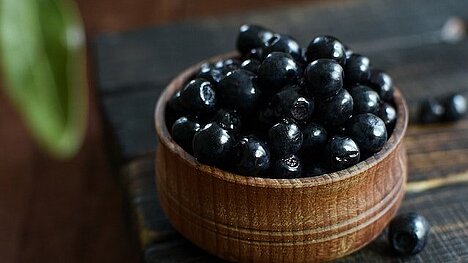Blackcurrants

What are blackcurrants?
Blackcurrants (botanical name: Ribes nigrum) belong to the gooseberry family and are related to red and white currants. They originally come from northern, eastern and central Europe and have been cultivated since the Middle Ages. The berries are usually processed into juice, jam, liqueur or sweet pastries, but can also be eaten fresh.
Blackcurrants have a high vitamin C content (200 mg per 100 g), which strengthens the immune system and protects cells from free radicals. They also contain iron (1.3 mg per 100 g), which is important for the formation of red blood cells, and potassium (322 mg per 100 g), which supports kidney function and regulates blood pressure. Blackcurrants are also rich in fiber (4.3 g per 100 g), which aids digestion and provides satiety, and anthocyanins (up to 600 mg per 100 g), which belong to the polyphenols and have an anti-inflammatory and vasoprotective effect.
Can dogs eat blackcurrants?
The answer to this question is not entirely clear. There is conflicting information about whether blackcurrants are poisonous to dogs or not. Some sources claim that blackcurrants are one of the same fruits as grapes and raisins, which can cause acute kidney failure in dogs. Other sources, however, state that blackcurrants are safe for dogs and even have health-promoting properties.
The truth is probably somewhere in between. There are no scientific studies that prove that blackcurrants are toxic to dogs. However, there are also no studies that prove the opposite. It is possible that some dogs are more sensitive to blackcurrants than others, or that the toxicity depends on the amount or method of preparation. It is therefore advisable to be cautious and only give your dog small amounts of blackcurrants or avoid them altogether.
What are the benefits of blackcurrants for dogs?
If you decide to give your dog a few blackcurrants from time to time, you can give them some health benefits. The berries can:
- strengthen the immune system and protect against infections
- protect cells from oxidative stress and slow down ageing
- Promote blood formation and prevent anemia
- support kidney function and flush out excess water
- strengthen bones and muscles and prevent osteoporosis
- promote digestion and relieve mild diarrhea
- Inhibit inflammation and relieve pain
What are the disadvantages of blackcurrants for dogs?
As mentioned above, there are also some potential disadvantages or risks associated with eating blackcurrants for dogs. The berries can:
- cause stomach problems, diarrhea or vomiting in sensitive dogs
- increase blood calcium levels in dogs with kidney or bladder problems and lead to kidney stones
- increase blood sugar levels in dogs with diabetes and lead to hyperglycemia
- trigger allergic reactions in dogs with allergies or intolerances
- impair liver function in dogs with liver disease
- inhibit blood clotting in dogs with blood clotting disorders and lead to bleeding
How do you feed blackcurrants to dogs?
If you want to give your dog blackcurrants, there are a few things you should keep in mind to minimize the risk of side effects. Here are some tips:
- Feed only ripe and fresh berries, not dried or processed products that may contain sugar or other additives.
- Feed only small amounts, no more than a few berries a day, and monitor your dog's reaction.
- Feed the berries as a treat or supplement to their food, not as their main food.
- It is best to feed the berries pureed or chopped so that your dog can digest them better.
- Do not feed berries from wild bushes, which may be contaminated with pesticides or harmful substances.
- Do not feed berries to dogs that are ill or have a pre-existing condition without consulting your vet first.
Blackcurrants are very healthy for humans, but not necessarily for dogs. There is no clear answer as to whether they are poisonous to dogs or not. Therefore, it is better to be cautious and only give your dog small amounts of blackcurrants or avoid them altogether. If you want to give your dog blackcurrants, you should take some precautions and observe your dog's reaction.
If you notice any signs of hypersensitivity or poisoning in your dog, you should see your vet immediately. We are not a substitute for a vet, but we try to be as accurate as possible. Every dog reacts differently and we recommend you get a second opinion or consult your vet if in doubt.
Stay healthy and take good care of your four-legged friend!😊